Columbia alum supports next generation of artists through South Loop nonprofit
November 30, 2022

When Sheila Fortson came to Columbia in pursuit of a master’s degree, she did not realize how the teachings awaiting her would open a whole new world of the arts.
Fortson focused on music and perfecting her musical craft, but she had never really focused on any other types of art.
“Growing up being involved in music, that’s really all I had ever focused on,” Fortson said. “And so it was a whole new world that was opened up for me when I got to Columbia, and I began to explore the five major art forms that were offered in my master’s program.”
Fortson graduated from Columbia’s master’s program in 2011 and walked out with a degree in interdisciplinary art. Through the arts exposure provided through the program, Fortson was able to explore five major art forms, which were all interconnected.
“After that experience, I kind of thought, ‘Man, if I had had an opportunity to explore some of these disciplines as a kid, I wonder if I would have gone a different direction,’” Fortson said. “And I also began to think about what I wanted my life’s work to be. … I felt sort of an urgency to offer kids an opportunity to explore more than one art form at a time.”
The five different arts forms that Fortson connected with through Columbia’s master’s program were music, visual arts, drama, dance and creative writing.
From there, Fortson turned her passion into action, as she opened up the FAME Center — which stands for Fortson Arts and Music Education — located in the South Loop at 1319 S. State St., after moving in September.
The FAME Center provides equitable access to arts education to the next generation of creatives. The center directly confronts the lack of accessibility to music and fine arts education opportunities in under-resourced Chicago communities.
Fortson said it is rewarding to see students come through the FAME Center’s program.
“It’s so rewarding because I know that they’re going to take this with them throughout their life,” Fortson said. “I believe fully that the arts are an important part of the human spirit and the growth of the human spirit. So I just see changes in everyone that comes through my door.”
The nonprofit operates in six pillars consisting of music, visual arts, drama and theatre, creative writing, digital art and art therapy. Fortson also incorporates mental health support into FAME’s programming.
“The mental health component of what we do is so important to me, because I feel like there is a mental health benefit, as well as so many other benefits to the arts. I mean, I see kids’ grades improve and see their self-confidence grow,” Fortson said.
AJ Buegel has been a music teacher at the FAME Center since 2020, working with her students both in-person and virtually.
Buegel said in her experience, music education is important because it is a place where students are able to “ask the most questions.”
Buegel believes music education is especially valuable for students whose brains are still developing, as it will give them a way to explore the world in an environment without fear of asking right or wrong questions.
Buegel’s students typically range from ages 7 to 14, but said she currently has a student who is as young as 6, and one grandmother who takes back-to-back piano lessons with her grandson at FAME.
Liesl Doxey-Crapo signed up her two children for programs through the FAME Center in summer 2022 after finding the organization in 2021. Doxey-Crapo said her kids went to a two-week camp three times over the summer and said it was a “great experience” for them.
Doxey-Crapo said having exposure to artistically-minded adults was a strengthening experience for her children.
“Most parents might be like, ‘Oh, they learned how to draw something,’ but for my kids, it was more of the experience of identity and expression and acceptance,” Doxey-Crapo said. “That was the biggest benefits to them.”
Doxey-Crapo said one of the major ways the FAME Center did this was by being sensitive to her children’s pronouns, as both of them use they/them pronouns.
Looking ahead, Fortson said the FAME Center wants to grow their scholarship program to bring more Chicago students into their classrooms. Fortson said their secondary goal would be to open up multiple FAME Centers in Chicago and eventually open them nationwide and globally as well.
“I would love to see us thought [of as a] leader in arts education,” Fortson said. “To be someone who’s on the cutting edge of doing art education differently.”







